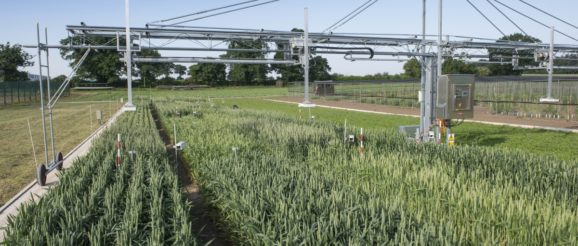Agri-tech innovation and working with industry

Dr Simon Aspland joined us in December 2019 as our new Head of Commercialisation.
We sat down with him to find out how he intends to help progress innovations originating at the John Innes Centre into practical applications.
“My role, in collaboration with Dr Jon Clarke, is all about helping the translation of the world-leading plant and microbial research that is being done here, into tangible impacts on the world around us, both commercial and societal.
Jon focuses on communicating the impact of that science, while I focus on our external translational activities.
There are lots of different routes to improve translation and I see my role as helping to develop these options, inform the John Innes Centre community about what their options are, and then help those who wish to pursue them, to do so.
I do this partly through providing what I call ‘scaffolding’, which is essentially just putting structures in place that support translation. These include processes for disclosing inventions and deciding whether and when to file patent applications, streamlining negotiation of agreements with corporate partners, enabling and mentoring the launch of spinouts and providing business development support. I’ll also be around to advise on any specific issues as they arise as we go through each process.
I’ve only been here a few months, but already I have seen first-hand how many different interests, relationships, approaches and opportunities there are to bring cutting-edge scientific research and industry together here. The potential I am finding around every corner and in every lab is exciting.
My initial conversations with the senior scientists here have been encouraging. As I would have expected, there have been understandable concerns raised about whether considering the commercial aspects of their work that this could impinge on applications, purely for the common-good.
I want to show that there are ways to address these concerns, and potential synergies between the pursuit of both goals. There is also a natural desire not to unnecessarily upset any existing partnerships.
My role includes increasing the productivity of existing relationships for the benefit of both the John Innes Centre as a scientific research institute, as well as our partners and then ensuring that we grow new, complimentary ones. Everything we do should be as rewarding as possible for everyone; scientist, industry and society.
Before I joined the John Innes Centre, I created, developed and managed early-stage, venture capital-backed biotechnology innovation businesses. We collaborated with a range of industries: including human health, industrial biotechnology, crop protection and animal health.
I began my biotech career after postdoctoral research at the University of California, San Diego following graduate and postdoctoral work with at the University of Cambridge on developmental genetics in Drosophila. The five biotechnology companies I cofounded were based on technologies including biochemistry, genomics and nature-inspired molecules.
Now I am here, and I can’t wait to assist the translation of as many John Innes Centre innovations as possible, for the benefit of us all.”
